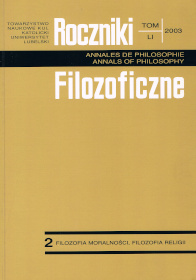Practical Scepticism (the quotation of Gary Malinas' paper)
Abstract
In Section 2 of his paper (which follows the introductory section) Gary Malinas „summarises three arguments that have been advanced in recent discussions of free agency and responsibility. The first concludes that free agency and responsibility are incompatible with determinism. The second concludes that free agency and responsibility are incompatible with indeterminism. The third concludes that the concept of a free and responsible agent is incoherent. Taken collectively, they entail the conclusion of the practical sceptic: No one acts freely and responsibly. If the summary case can be filled out so that it is sound, it undercuts a number of the commitments of the thick conception of persons the fulfilment of which, arguably, is required for free and responsible action. I believe that the summary case can be filled out so that it is sound. I will adopt this belief as an unargued assumption. It entails that no one acts freely and is truly responsible for their actions. I also believe that it is true that people act freely and responsibly. Once the case for practical scepticism has been put, I devote the remainder of this paper to the vindication of this latter belief. My claim is that practical scepticism is sound, yet nevertheless, it is also true that people act freely and responsibly. The onus of the vindication will be to disarm what appears to be an explicit contradiction. Section 3 proposes a definition of free and responsible action in terms of the concept of exculpation. It argues that judgements concerning agents' responsibility for their actions are often true under the presuppositions which are in place in the settings in which the judgements are made. Those presuppositions restrict the domains over which the judgements are semantically evaluated. The practical sceptic contests those presuppositions and thereby alters the domain of semantic evaluation. Under the influence of sceptical argumentation, possibilities of exculpation which had been properly ignored can no longer be ignored. Section 4 sketches an account of presupposing and when exculpatory possibilities are properly ignored. Section 5 considers the question of whether I have conceded too much to the practical sceptic”.
Copyright (c) 2003 Roczniki Filozoficzne

This work is licensed under a Creative Commons Attribution-NonCommercial-NoDerivatives 4.0 International License.





